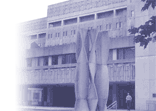About UTERP
The Program
The University of Toronto Epilepsy Research Program consists of epilepsy researchers at the University of Toronto and its associated teaching hospitals, plus others interested in epilepsy research.
Purpose
The Program is designed to promote epilepsy research by:
- enhancing communication
- promoting collaboration
- liaising with lay and governmental organizations
- promoting funding for epilepsy research
Membership
Membership is open to any epilepsy researcher at the University or its teaching hospitals. A membership application is to be submitted to the Director (below), accompanied by a curriculum vitae. Membership applications will be approved by the Program Board (below).
Members apply in one of the following categories: undergraduate, graduate student, post-doctoral fellow, basic science researcher, clinical researcher, interested clinician, interested lay person.
Administration
Director
The Director of the Program is appointed by the Dean of Medicine, and reports to the Dean (or a designate). Applicants are limited to members with full-time academic or hospital appointments. The Director is unpaid, and serves for a term of 5 years.
Board
The Director is assisted and advised by a Board consisting of the following: 1) the Director him/herself; 2) the holder of the Michael Bahen Chair of Epilepsy Research; 3) the heads of the clinical epilepsy programs at the Hospital for Sick Children and the Toronto Western Hospital; 4) a representative from a lay organization, such as Epilepsy Ontario; and 5) one member elected by members of each of the membership categories (above). Most elected Board Members will serve for staggered terms of three years. Undergraduate researchers, however, are elected yearly. If the Director holds the Bahen Chair, or is the head of a clinical program, he/she has only a single vote on the Board.
The Board meets at the discretion of the Director, but at least twice a year.
Annual General Meeting
The entire membership meets once a year for a Business Meeting, which is scheduled in conjunction with an Epilepsy Research Day.
Activities
The Program:
- sponsors a weekly fellows research meeting
- publicizes research meetings and clinical rounds occurring at the various hospitals
- initiates an Epilepsy Lecture series
- sponsors an annual Epilepsy Research Day
- mounts a training program for epilepsy researchers, both basic-science and clinical
- develops a graduate course in epilepsy for students at the University of Toronto
- cooperates with lay organizations, such as Epilepsy Ontario and Epilepsy Toronto, in providing information to the public
- lists and circulates the various sources of funding for epilepsy research
- joins with the Canadian League against Epilepsy, the Canadian Pediatric Epilepsy Network and the Canadian Epilepsy Consortium and other lay and scientific organizations in lobbying the CIHR for more funds for epilepsy research
- consults with the Dean of Medicine about fund raising to put the Program on a firm financial basis (Funds could be used to provide salary stipends for junior members and seed money for beginning projects.)
- establishes a website

